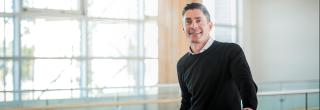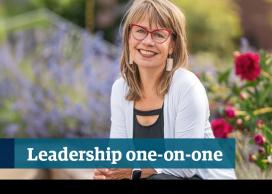Michael White joined UBC in 2014 as Associate Vice-President of Campus and Community Planning, and leads a team dedicated to creating a vibrant, live-work-learn community at the university’s campuses in Vancouver and the Okanagan.
A UBC alumnus, Michael is passionate about the intersection of community engagement and urban planning. He spent 10 years as a municipal planner for the City of Vancouver and later worked as manager of planning in Abu Dhabi, United Arab Emirates. He returned to Canada in 2011 as a consultant, before joining UBC in 2014 to begin his current role.
Q1. What quality do you most admire in a leader?
MW: The ability to listen. Sometimes, there can be a tendency to just announce or defend your decisions, but I think a great leader will listen and try to understand others before they come to judgment.
Q2. What makes you laugh?
MW: A lot of things make me laugh — lately, I love the great questions I get from my two kids, aged five and seven. The questions they ask at this age are so pure and innocent, and demonstrate a curious view of the world that’s also incredibly accurate (and sometimes startling!).
Q3. Who inspires you, and why?
MW: I would say there are quite a few people who inspire me, both historical and current, but one person I’m really amazed with recently is Gord Downie. I’m inspired by his courage, passion, and altruism — he is truly remarkable.
Q4. After working as a manager of planning in Abu Dhabi, what drew you back to Vancouver?
MW: Having been in Abu Dhabi for four years, and starting our family, my wife Lisa and I wanted to come back to Vancouver to raise our kids where the rest of our family and friends are. We also missed living here — when you live abroad, you really appreciate everything that Canada offers.
Q5. What is the most important lesson that you’ve learned?
MW: A phrase that I always carry with me, and something that I learned early in my career, is that ‘all behavior makes sense.’ You have to try to understand what people’s motivations and interests are, because what is driving their behavior is very rational and meaningful to them. Instead of shutting people out, it is important to explore and be curious about what’s going on for people.
Q6. What does a typical workday look like for you?
MW: When you work as an urban planner, people assume that you’re off quietly creating in your office. And sometimes that is true. But typically, my day also involves engaging heavily with different people in the administration, the community, the Board, First Nations, various levels of government, and others. Day-to-day, it’s really about having a continuous conversation with all of the people that interface with Campus and Community Planning.
Q7. How do you like to recharge?
MW: Balancing adventure with unwinding. Weekends and holidays are usually about family activities, whether that be skiing, soccer, swimming or travel (our next stop is the Southwest this summer). My wife and I also try to carve out time just for us — strolling and going out for dinner in the neighbourhood. I play ice hockey two or three times a week, and I try to cycle to work (although I’ll admit, I’m a fair-weather cyclist!).
Q8. What’s the best advice that you were ever given?
MW: It was something I read by Joseph John Campbell, an American mythologist and writer: ‘follow your bliss.’ He looked at the world’s religions and mythologies and pulled out what he felt was this common theme of following bliss, and it really resonated with me. You have to follow your passion.
Q9. For you, what makes UBC different?
MW: UBC is different because it’s the integration of a university with a quasi-municipality. We’re a town and a university at the same time, and this provides all kinds of interesting opportunities to partner and demonstrate research on the ground. For example, with our Campus as a Living Lab and SEEDS programs, we have researchers and students conducting hundreds of research projects within our community. We can try things here that might not be possible elsewhere.
Q10. You’re on the Steering Committee for the development of UBC’s new strategic plan. What’s your perspective on the importance of a process like this and why people should get involved?
MW: I’m an active participant in the strategic planning process, both on the Steering Committee as well as the engagement team. Processes like this are critically important for an organization and community because they open a conversation for all to engage in setting the future direction — and I emphasize the word ‘conversation’ — so that people’s needs and interests can be heard. This is critical for the success of any plan, because if people do not feel a sense of ownership and belief in their organization or community, then the plan is unlikely to succeed.
Q11. What do you value in your colleagues?
MW: We thrive because we are a collaborative team, and we’re highly supportive (and we have a fair bit of fun!). We treat our successes and failures as a team, and you can see that in how our directors and team support each other. There’s also a level of passion that I admire and value. You can tell that the people on our team love what they do.
Q12. If you could have a superpower, what would it be?
MW: It would probably be the power to travel through time. I’m driven by my curiosity, and would love to experience some of history’s important moments first-hand.
Q13. What are some of the biggest challenges for Campus and Community Planning?
MW: We’re a campus that’s growing significantly, and we play an integral role in the region’s economy and culture, but one of the things we really struggle with is moving people to and from campus. We really need completion of rapid transit to the Vancouver campus to help with congestion. It will also be important to provide access to more housing, and to leverage UBC’s role in the regional economy and culture.
We have a lot of opportunities to support the growth of research and innovation in a very competitive global environment. For example, we’re planning innovation hubs at Point Grey, Robson Square, and in the Okanagan, as well as supporting the growth plans of several faculties across our campuses.
Q14. What would you like to be remembered for?
MW: Two things, I guess. Someone who fully engaged life and all the people around me, and leaving this planet in a better place than we found it!
Published: April 1, 2017
Interviewed by: UBC Internal Communications



